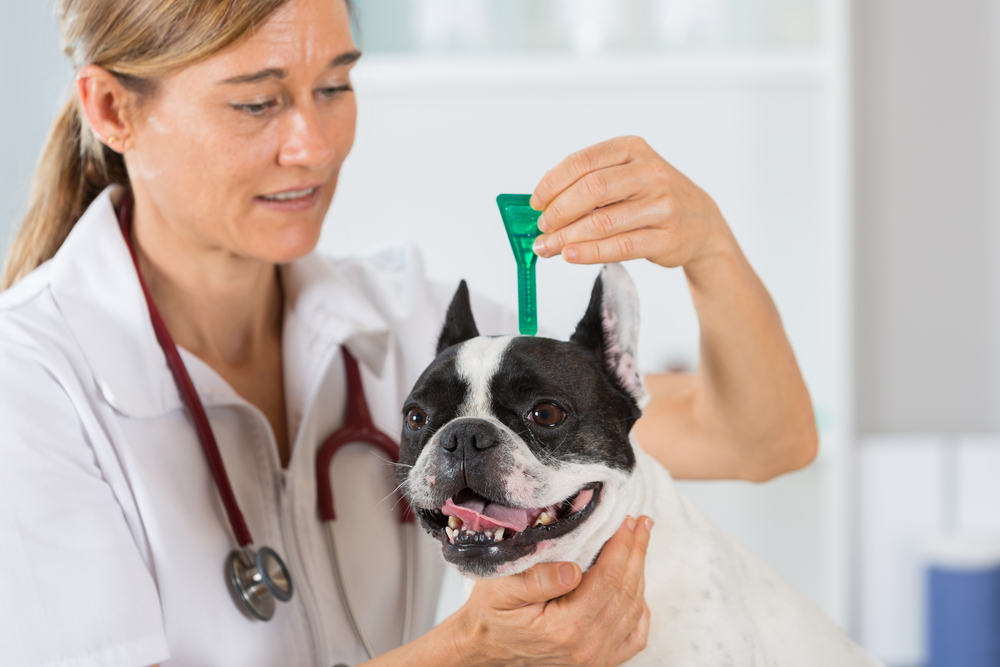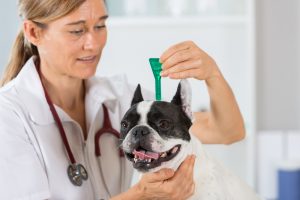Fleas in Dogs

Free Pet Insurance Comparison
Compare Quotes From Top Companies and Save
Secured with SHA-256 Encryption
Dr. Pippa Elliott BVMS, MRCVS
Veterinarian
Dr Pippa Elliott BVMS, MRCVS is a veterinarian with over 30 years of experience in companion animal practice. In 1987 she graduated from the University of Glasgow, with a degree in veterinary medicine and surgery. She works at Blythwood Vets and the People’s Dispensary for Sick Animals (PDSA). Pippa is an advocate of Fear-Free Practice, an animal addict, and a veterinary writer. She is also w...
Veterinarian
UPDATED: Feb 3, 2025
Pet Insurance U receives compensation from the third parties included on this site. This includes payment for clicks from our site to insurance providers’ sites and quote requests generated. Our rankings and reviews are not affected by payments from the insurance companies. The compensation we receive allows the site to be free and regularly updated. Our goal is to review every pet insurance provider, but not all companies are listed on the site.
And many of the companies we review do not pay us anything. We simply rate, compare and review their plan because we feel it will be valuable to you. Our reviews are guaranteed to be unbiased, professional and advertising compensation does not influence rankings.
We are a free online resource for anyone interested in learning more about pet insurance. Our goal is to be an objective, third-party resource for everything pet insurance related. We update our site regularly, and all content is reviewed by pet insurance experts.
UPDATED: Feb 3, 2025
Pet Insurance U receives compensation from the third parties included on this site. This includes payment for clicks from our site to insurance providers’ sites and quote requests generated. Our rankings and reviews are not affected by payments from the insurance companies. The compensation we receive allows the site to be free and regularly updated. Our goal is to review every pet insurance provider, but not all companies are listed on the site.
And many of the companies we review do not pay us anything. We simply rate, compare and review their plan because we feel it will be valuable to you. Our reviews are guaranteed to be unbiased, professional and advertising compensation does not influence rankings.
On This Page
Fleas in dogs are probably one of the most common health issues and irritants to dogs.
Not only do they make your dog itchy, but they can also quickly invade your home making all pets and humans very unhappy!
The best thing you can do for your dog (and you) is to catch the fleas before they start.
While most flea bites aren’t dangerous, if left untreated, they can lead to secondary infections or even skin lesions if your dog is allergic to fleas.
Puppies can even develop anemia if they have an abundance of flea bites.
Table of Contents:
Need Pet Insurance?
FACT: Pet insurance pays up to 90% of vet bills when your pet is sick or injured!
How To Know When Your Dog Has Fleas
Some of the most common symptoms if your dog has fleas are the following:
- Excessive scratching
- Excessive licking
- Areas of hair loss
- Presence of flea dirt
- Weakness and pale mucous membranes in severe cases
- Hair loss
- Scabs and hot spots
- Pale gums
Live fleas may or may not be seen. Dogs with a high sensitivity to flea bites often remove the insects via scratching and licking before you or even your vet has a chance to see them.
That is why it’s important to see the signs.
Fleas are about the size of a grain of rice. They jump on and off pets and have no wings. They can be observed by the veterinarian or owner.
Dogs often accidentally ingest fleas, which can cause infection with tapeworms.
If you can’t find any fleas, they can also be identified by their poop.
Related: 10 Things You Must Know Before You Buy Pet Insurance
Enter your ZIP code below to view companies that have cheap pet insurance rates.
Secured with SHA-256 Encryption
Allergic Reaction to Fleas
Some dogs can even have an allergic reaction to fleas.
If a dog has an increased sensitivity to the saliva of fleas, a flea bite can cause an allergic reaction.
This condition is called flea dermatitis and the symptoms are typically the following:
- Intense itching
- Hair loss
- Red skin, scabs, and hot spots.
Flea allergy dermatitis can often lead to secondary skin infections.
Read more: Does pet insurance cover flea medication?
Real Cost Savings from PetFirst Clients

Luna
PetFirst saved his parents
$6,712
A happy energetic Luna one morning couldn’t hold her food down. After months of multiple costly vet visits to specialists and an endoscopy, the problem was discovered and fixed. Luna put 22 pounds back on in no time and her parents were grateful for having PetFirst by their side to pay the bills.
Why Did My Dog Get Fleas?
There isn’t a specific reason why a dog will get fleas, but if a pet in your home has fleas that haven’t been treated, there is a strong likelihood that your dog and other pets can get fleas too.
If you live in a warm or humid climate, like Florida or Texas, fleas tend to be more rampant there and monthly flea prevention treatment is usually recommended.
All outdoor dogs are even more susceptible to fleas.
Flea Treatments

If you think your dog has fleas, make sure to see your veterinarian to confirm that they are fleas and to recommend the best treatment.
Your dog’s itching could be indicative of some other ailment, like hot spots or ear mites.
Depending on your dog, your veterinarian can discuss the best treatment option to treat the fleas and also prevent the fleas from re-occurring.
Most of the common treatments are liquid or even topical treatments that are placed at the back of your dog’s neck.
There are many over-the-counter non-prescription flea preventative medications that are very effective and should be given to your dogs’ monthly.
Some dogs with increased susceptibility or higher than average exposure to fleas may require preventative care more often.
The typical cost of treating fleas ranges from $40 to $50 a month.
When treating fleas on any pet in your house, it is important that all are other pets including indoor and out cats.
Enter your ZIP code below to view companies that have cheap pet insurance rates.
Secured with SHA-256 Encryption
Natural Flea Remedies For Dogs
There are many natural home remedies you can try to see if they help get rid of and prevent fleas on your pets.
Most can be very effective and are chemical free.
Flea Collar Made With a Bandana and Natural Oils
A flea collar is a great way to ward off fleas without always having to reapply something topically, and it keeps the flea control constant and steady.
You can make a home-made flea collar with olive oil and water mix – 3 – 5 drops of cedar oil and 1- 3 tablespoons of water.
Mix and put the oil on a bandana or even your dogs or cat’s collar and re-apply weekly.
Apple Cider Vinegar
Apple cider vinegar is a great addition to your pets’ diet for so many reasons. It can be used to get rid of fleas as well.
To get temporary relief, you can mix apple cider vinegar and water in a proportion of 2:1.
Mix it well and fill it in a spray bottle. It can help the fleas to jump off of your pet.
You can also drench your dog or cat’s fur with this solution and comb it gently. Generally, this remedy works for almost 3-4 days.
As a preventative, add it to your pup’s water – or even cat’s (if they will drink it).
Flea Comb
A flea comb is a great way to get rid of fleas. Slowly drag the comb across the hair close to the cat’s skin.
Comb more in those areas where fleas are likely to hide such as base of the tail, armpits and groin.
Keep a bowl of soapy water close to you. As you remove fleas, drown them in this water.
White Vinegar
White vinegar is also one of the best remedies to remove fleas from dogs and cats.
Use white vinegar while cleaning or giving a bath to your pet. Add some white vinegar to water and pour it on the body of your pet to prevent flea infestations.
Cedar Chips
Cedar chips are used to keep fleas away. You can place cedar chips on pet’s bedding.
You can also place it around outside spaces to control the growth of fleas.
Lemon Spray
Lemon with its citrus properties kills fleas. Cut lemons and put them in boiling water. Steep it overnight.
Pour the solution into a spray bottle. Squirt the solution on the flea affected areas of your dog or cat behind the ears, head and at base of the tail.
Or else, you can soak a piece of cloth in the solution and rub it gently on the infected regions (especially for cats who aren’t always fond of citrus).
Dawn Dishwashing Liquid
Dawn dishwashing liquid is also effective for repelling fleas.
Just add a few drops of blue-colored dawn dishwashing liquid in regular bathing water of your pet.
This kills fleas and provides relief to pets. Use it as a shampoo for your pet.
Ensure that you rinse it thoroughly to prevent irritation on the skin.

Can Pet Insurance Help With Fleas?
While most pet insurance plans do not offer flea or parasite prevention on their basic policy.
However, if the dog insurance plans offer wellness and routine care coverage, there is generally an annual allowance to help pay for flea and other parasite prevention.
Pet insurance companies like Embrace and Pets Best offer wellness plans if this is of interest to you.
Prevention
There are many ways you can prevent fleas and include the following:
- Always keep your house clean and thoroughly vacuumed.
- Watch for fleas by using a flea comb on your dog and washing your dog’s bedding weekly.
- If you have a yard, you will need to treat it as well as your house if your dog developed fleas.
- Use flea shampoos even if there aren’t any fleas present. If they are too harsh, brewer’s yeast and garlic added to your dog’s food might also help repel fleas.
- Apple cider vinegar added to your dog’s drinking water has been known to not only deter fleas but improve your dog’s skin and coat condition.
As always, the best way to treat fleas is to prevent them from occurring by having your dog on a monthly treatment at the first site or onset of fleas.
If you think that fleas are not the culprit and another dog health issue, our dog health glossary can give you some other ideas of what might have occurred.
Other articles you may find helpful:
Is Exotic Pet Insurance Necessary?
The Best Pet Insurance By State
Fun Facts, Dog FAQ, And Unsolicited Dog Advice
5 Training Commands to Save Your Dog’s Life
The Ultimate Guide to Safe Foods for Dogs
We get it, your dog is like your child and when your puppy or dog has health problems it is scary. Luckily there is pet insurance companies that will help you pay for any veterinarian care they made need. Checkout the best puppy and dog pet insurance companies and learn about common puppy health issues and ailments in older pets.
Common Health Problems:
Chronic Active Hepatitis in Dogs
Cruciate Ligament Tear in Dogs
Degenerative Myelopathy | Spinal Cord Disease In Dogs
Dementia in Dogs | Canine Cognitive Dysfunction
Dog Comedones (Schnauzer Bumps)
Dog Diarrhea: What Can You Do To Help?
Gallbladder Obstruction in Dogs
Heart Murmurs In Dogs | How To Identify Them
Intervertebral Disc Disease In Dogs
Nasal Solar Dermatitis In Dogs
Progressive Retinal Atrophy In Dogs
The Dog Flu – Symptoms & Treatment for Canine Influenza
Enter your ZIP code below to view companies that have cheap pet insurance rates.
Secured with SHA-256 Encryption
Frequently Asked Questions
How do I know if my dog has fleas?
Common symptoms include itching, scratching, and visible signs of fleas. Fleas are about the size of a grain of rice and can be observed on your dog’s skin. Additionally, flea droppings may be present, resembling dark specks.
Can fleas cause health issues for my dog?
While most flea bites aren’t dangerous, if left untreated, they can lead to secondary infections or skin lesions, especially if your dog is allergic to fleas. Puppies can even develop anemia due to an abundance of flea bites.
What is flea dermatitis, and how does it affect dogs?
Flea dermatitis is an allergic reaction to flea saliva. Symptoms include itching, redness, and hair loss. It can lead to secondary skin infections and requires prompt treatment.
Why did my dog get fleas, and can other pets in my home get them too?
There isn’t a specific reason why a dog gets fleas. If one pet in your home has fleas, there’s a strong likelihood that other pets can get them too. Fleas are more rampant in warm or humid climates.
How do I treat fleas on my dog?
Consult your veterinarian to confirm the presence of fleas and determine the best treatment. Treatments include liquid or topical options applied to the back of your dog’s neck. Over-the-counter flea preventatives are also available.
Are there natural remedies for preventing fleas on dogs?
Yes, natural remedies include making a flea collar with a mix of olive oil, water, and cedar oil. Other remedies include apple cider vinegar, flea combs, white vinegar, cedar chips, lemon spray, and Dawn dishwashing liquid.
Can pet insurance help with flea prevention costs?
Most pet insurance plans don’t cover flea prevention in their basic policies. However, if a plan includes wellness and routine care coverage, there’s usually an annual allowance to help pay for flea and parasite prevention.
How can I prevent fleas on my dog?
The best way to treat fleas is to prevent them by using monthly flea prevention treatments. If you live in a warm or humid climate, where fleas are more common, monthly prevention is especially recommended.
Are there specific pet insurance plans that cover flea prevention?
Some pet insurance companies, such as Embrace and Pets Best, offer wellness plans that may cover flea and parasite prevention. Check with the specific insurance provider for details.
What are the natural home remedies for getting rid of and preventing fleas?
Natural remedies include making a flea collar with natural oils, using apple cider vinegar, flea combs, white vinegar, cedar chips, lemon spray, and Dawn dishwashing liquid. These remedies can help repel and eliminate fleas in a chemical-free way.
Enter your ZIP code below to view companies that have cheap pet insurance rates.
Secured with SHA-256 Encryption
Dr. Pippa Elliott BVMS, MRCVS
Veterinarian
Dr Pippa Elliott BVMS, MRCVS is a veterinarian with over 30 years of experience in companion animal practice. In 1987 she graduated from the University of Glasgow, with a degree in veterinary medicine and surgery. She works at Blythwood Vets and the People’s Dispensary for Sick Animals (PDSA). Pippa is an advocate of Fear-Free Practice, an animal addict, and a veterinary writer. She is also w...
Veterinarian
We are a free online resource for anyone interested in learning more about pet insurance. Our goal is to be an objective, third-party resource for everything pet insurance related. We update our site regularly, and all content is reviewed by pet insurance experts.
